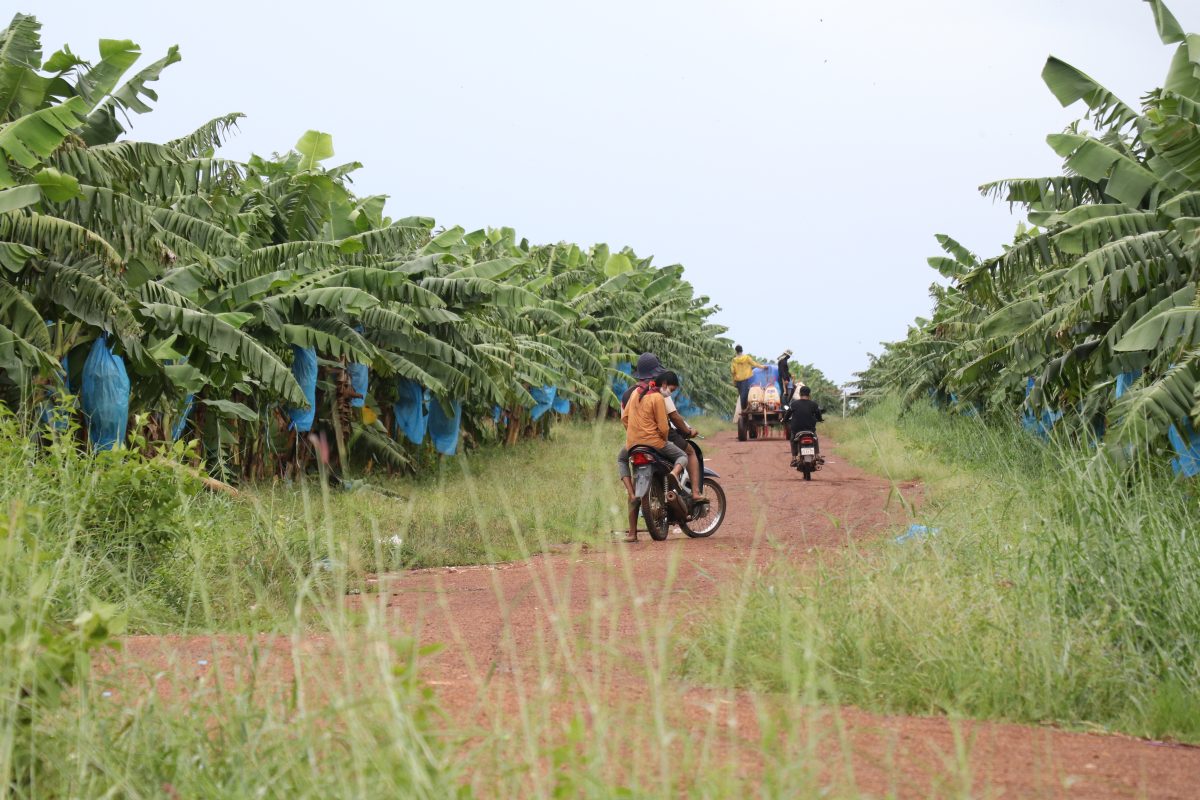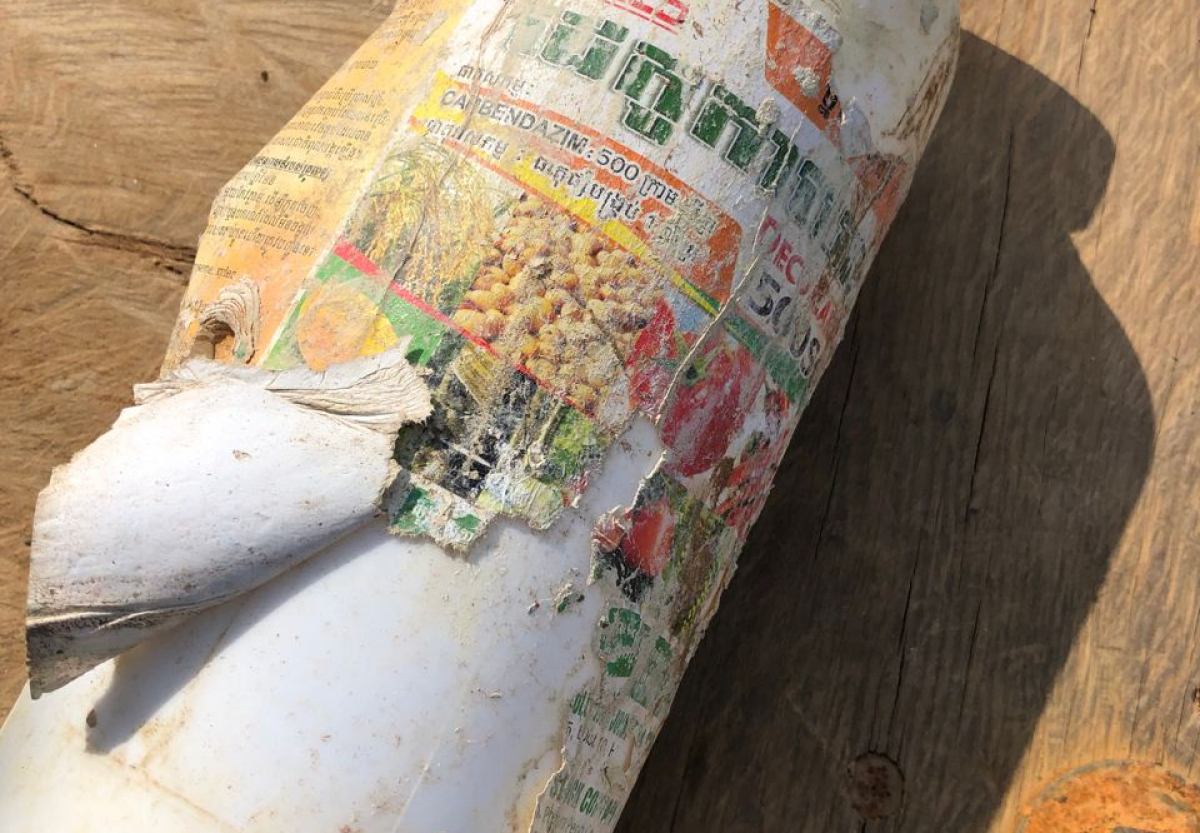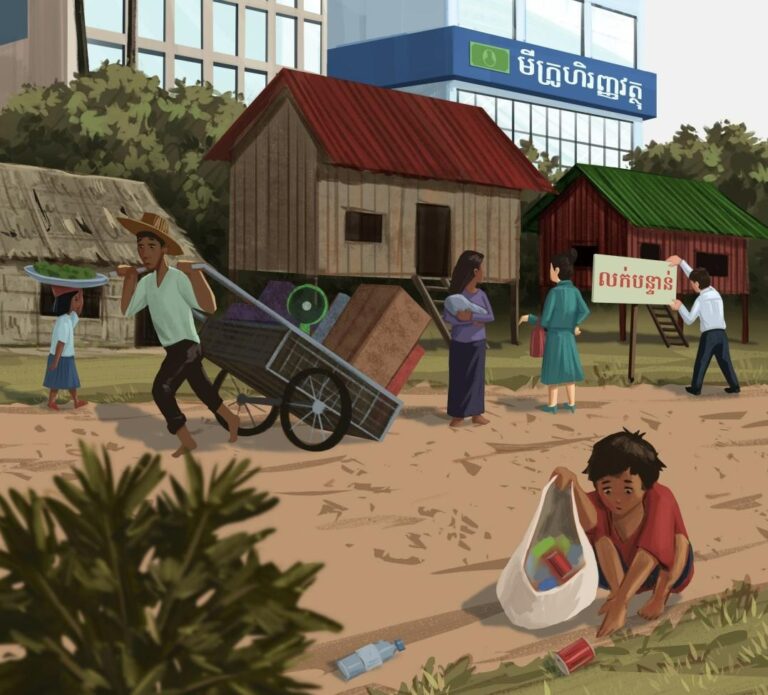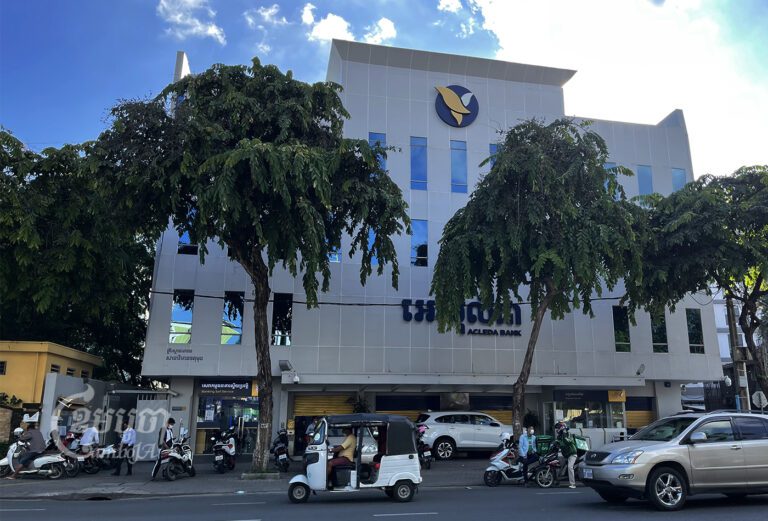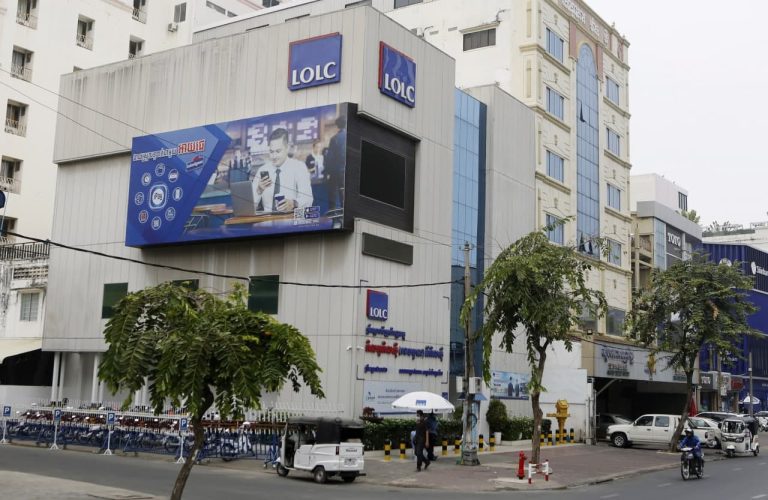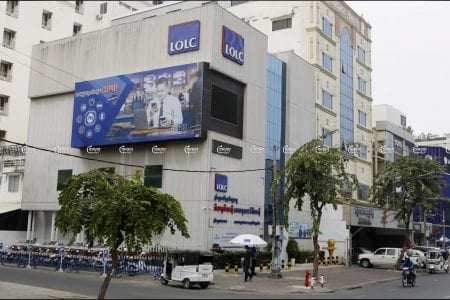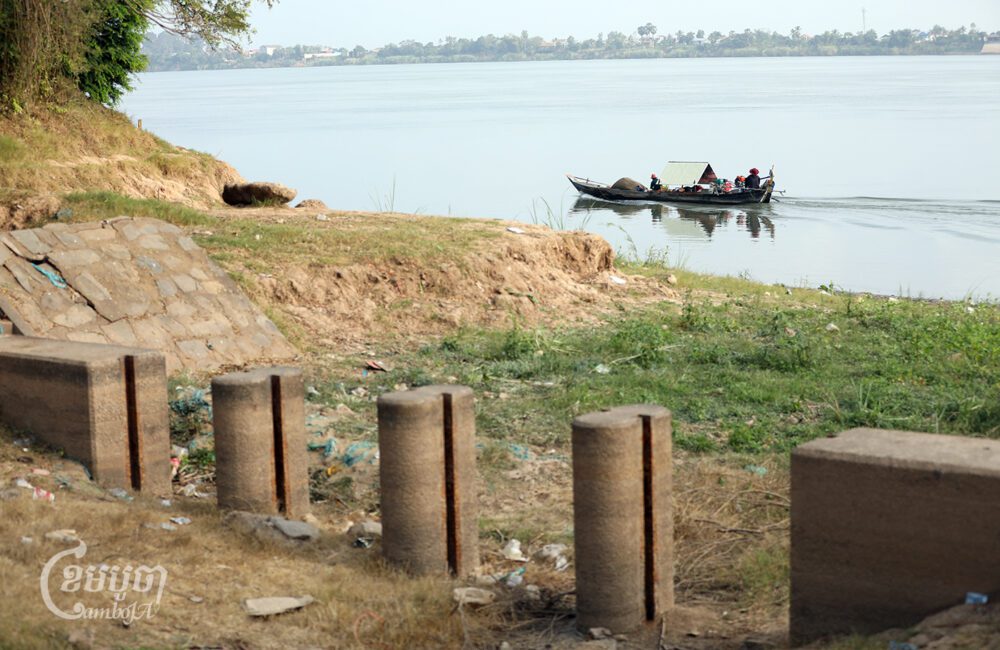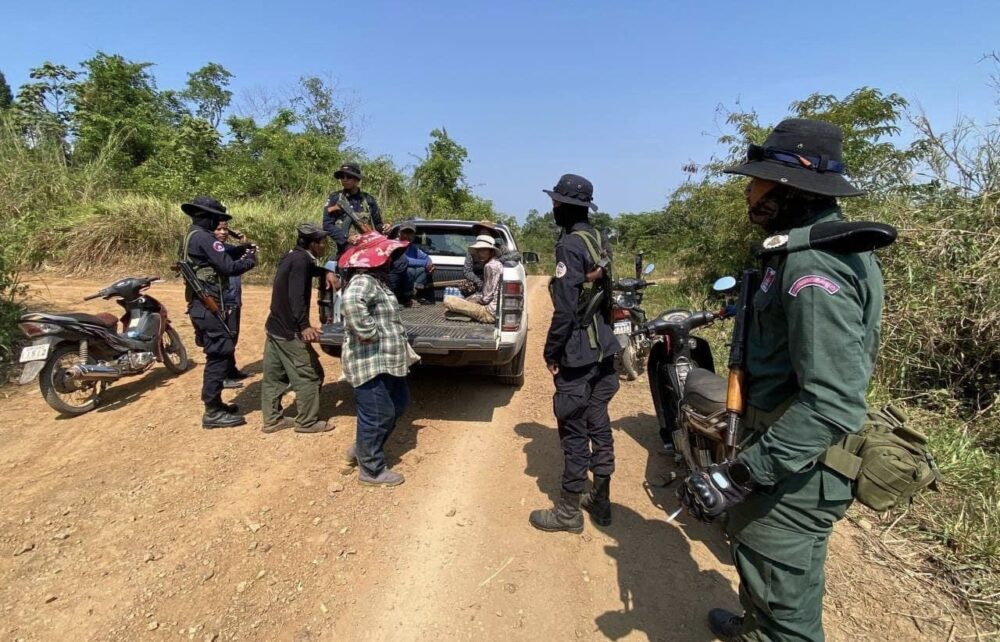Lumphat District/Ratanakiri Province – “I have had stomach and intestinal problems for many years since I worked on the banana plantation, but I never thought this was due to the chemicals,” said 37-year-old Soy Srey Phoeun, just minutes after she returned from her latest trip to the hospital, with an IV drip still attached to her arm.
She migrated from her native Svay Rieng province, along the Vietnamese border, to Ratanakiri in northern Cambodia more than 10 years ago. While she originally worked on a palm oil farm, in the last five years the company switched to producing bananas, and that’s when the health problems began. In addition to her stomach issues, she also suffers from headaches, dizziness and vomiting.
Phoeun’s story is far from unique, as many rural workers in need of money are increasingly turning to foreign-backed banana plantations, despite apparent health risks from damaging chemicals. Most workers say the job pays well, incentivizing cash-strapped Cambodians who are under pressure from both the COVID-19 economic crunch and an ongoing microfinance crisis that has left millions in debt. The situation is so desperate, that many are sending their children to work the plantations as well.
Phoeun works at a plantation run by Vietnamese company Thagrico. She said most of the other workers didn’t think about or care about exposure to chemicals. “Most workers seem not to care about this. Working here is helping our daily livelihood, because if we were not working here, we have nothing to do,” she said. Phoeun said she works eight hours a day, sometimes longer, and only gets a 30-minute break each day.

Another Thagrico employee, 36-year-old Kao Chen, said he too experiences dizziness and headaches after working on banana plantations for the last eight years. He said he and his wife each earn $12.50 per day wrapping bananas that have been sprayed with chemicals.
“They told us to stay away from the banana trees because it will affect our health. But we can still absorb it anyway,” he said. “I am also concerned about my health in the future because we absorbed the chemicals for years,” he continued. But like Phoeun said he needs the job to get by. Chen said the company does not provide equipment to the workers, forcing them to buy their own gloves, facemasks and boots.
“When we get sick, we need to go see the doctor ourselves, the company does not provide medical and health care service to workers, so we spend all the money that we earn on medicine,” he said. Chen called for the Cambodian government to intervene and ensure the chemicals being used are safe.
Fueled by microfinance crisis
In recent years, Cambodia has been gripped by an increasing microfinance debt crisis. The unregulated industry is reportedly rife with predatory lenders who encourage impoverished people to take out loans they can’t pay back, often then pushing them to take out new loans to pay outstanding debt. Reports of land seizures, risky migration for work, and even reducing food intake are all associated with the ongoing crisis.
Many of the workers at the banana plantations said they were aware of the health risks but were driven to take on the possibly dangerous work in order to pay off their mounting debts.

One worker, Kim* (not her real name), said she took out a $7,500 loan from microfinance company LOLC to buy equipment for her cassava farm. “I am also scared of the chemicals used in the plantation, but there is nothing I can do. If I do not work there, I would not be able to find any income,” she said. Kim was able to pay back her loans comfortably at regular intervals while working on the banana plantation but said when work was suspended she had to request that LOLC postpone her payments on principle loans and only pay interest.
She said when she used to work for a plantation that produced bananas that were shipped to Japan, she became very sick from a chemical that was sprayed to keep the bananas from ripening too early. “I got cold-like symptoms – stuffy nose and irritated eyes. I couldn’t sleep from it,” she said. She said the chemicals, which smelled like bleach, also caused muscle pains and dizziness. “Even the vendors outside the banana plantation, they cannot stand the chemicals,” she said.
She said the doctor recommended that she stop exposing herself to the chemical, but said the company reduced the amount of chemicals and she “became used to it”. The company did not help pay for her medical treatment, and while it supplied gloves and boots, it told workers to buy their own facemasks.
Sophea* (also not her real name), just 20 years old, works at the Vietnamese-backed T.Y.T.B Angkor Banana plantation in Stung Treng province, where she too has fallen ill from exposure to chemicals. She used to work in a garment factory in Phnom Penh, before returning to her home province to work at the banana plantation as COVID-19 spread in the capital and she became afraid of contracting the virus. Like Kim, Sophea’s family took out a microfinance loan that has left them in a precarious position. They borrowed $2,500 from AMK to buy a motorbike in 2019 and are paying it back in monthly installments of around 300,000 riel per month, roughly $75. At the packaging unit, she can make around 25,000 riel per day, and if she works cutting the bananas, she makes up to 34,000 riel in a day.
“It caused my eyes to become irritated, I was sneezing and coughing. I couldn’t sleep at night. Some days I can’t sleep the whole night because I cannot close my eyes. My eyes feel itchy and teary the whole time. It took me about two weeks to one month to get used to the chemical,” she said.
Sophea took some tablets to treat her symptoms but said she cannot afford more thorough medical care. Like many others, she said T.Y.T.B Angkor Banana doesn’t provide protective gear, so she has to buy two masks every day and a pair of rubber gloves every few days. Despite these risks, she says the job is worth it given the high daily pay rate.

Back in Ratanakiri province, nearly an entire family is working for the Thagrico plantation. The Laeng family took out two microfinance loans to build their house, an example of an unproductive loan, given that it doesn’t generate any additional income to pay back the original debt. They borrowed $7,000 from Village Bank which is now LOLC and $1,000 from AMK.
Laeng Mean, her husband, and her younger brother all work at the plantation spraying chemicals on the bananas, earning around 36,000 riel per day, roughly $9. Mean said the chemicals are loaded into a 15-liter container which is strapped to her back and she sprays about 25 containers’ worth of the chemical substance each day. “It hurts my body since I need to carry the containers every day and walk long distances as well,” she said. “There are a lot of chemicals. But we need to work for money,” she said.
Widespread use of underage workers
But those aren’t the only members of the Laeng family flocking to the plantation. Mean’s 11, 14 and 17-year-old sisters have also worked there. The 11-year-old worked by removing banana leaves, but eventually her family stopped her because they were concerned she would get sick. The 14-year-old earns around $1.25 per hour placing stickers on the bananas, and often works two or three hours overtime to earn more money. She works while standing, saying that the labour leaves her physically sore and “exhausted”.
“Now I don’t feel pain, but when I start working, after four or five minutes, it will hurt again,” she said as she prepared to leave for the plantation. The 17-year-old also works extra hours when she can, filling banana carton boxes with Styrofoam.
“I want my sisters to continue studying. I don’t want them to drop out of school,” Mean said. “But if they want to stop studying and earn money, it is their choice. I don’t force them since I don’t have the money to support them.”
Ham Sopha, the plantation’s meka, or recruiter, admitted there are some underage workers, including her own sons aged 15 and 17, who spray the bananas with pesticides. One of her sons said he had nothing else to do because classes were suspended due to COVID-19, but is also considering completely dropping out to work. Lai Samuth, a Thagrico security guard, said his 12 and 16-year-old daughters also work at the plantation because school was suspended, earning around $6.25 per day spraying chemicals on the bananas.
Som Channy, a 15-year-old, dropped out of grade 6 to begin working at a plantation in September of this year, where she makes 25,000 riel in a day.
“I followed my friend. Working in the warehouse is not hard for me. I just need to cut the banana. During the break, we can also hang out there. We can hang out in the warehouse, because it is also air-conditioned so it is cool,” she said. Channy said the management asked for no ID to check her age, only for a COVID-19 vaccination certificate. She added that she has seen children as young as 12 working at the plantation, often accompanying their mothers.

Collateral damage
But it’s not only those who work at the plantations who are being affected, as the chemicals seemingly poison the entire ecosystem. Mom Visnak said she had to physically move her wooden home 150 meters to be farther away from the T.Y.T.B Angkor Banana plantation, which she said uses drones and trucks to recklessly spray the area.
“Since they started spraying the chemical, I always cough. In one month, they take maybe two to three days breaks. Those are the only days I do not have the symptoms,” she said. She said her three young children have gotten fevers, blisters and throat irritation from the spraying, requiring five trips to the hospital last year alone.
Visnak describes a depressing routine when she hears the spray trucks driving by. First, she brings her children to the backyard away from the road. Then she takes any clothes that are hanging down to stop them from being sprayed and later causing itchiness and rashes. She tries to cover her cooking dishes and then washes them all again when the spraying is done to try to stop the chemicals from getting in their food. Visnak is even afraid to use water from a nearby stream, and while she tried collecting rainwater, she said when the company sprays, the collected water gets contaminated and ruined.
She tried to complain to commune officials in 2020 but was told by local authorities that the spray was harmless fertilizer and that the company would stop, but it never did. “They said the chemical is not harmful to human health. It is not harmful but we would cough and get itchy skin rashes,” she said. “They did not pay attention to us.”
Su Meth, General Manager of T.Y.T.B Angkor Banana plantation denied all of the accusations that were sent the company’s way. He said the company provides adequate protective equipment such as facemasks and gloves, directly contradicting reports from the workers.
Despite insisting that they offered protective gear to workers, he also claimed the chemicals are harmless. It’s not clear why they would need protection from harmless chemicals.
“We have provided them with free face masks and gloves to prevent them from exposure chemical substances,” he said. “People complained to the district authorities, we already told them that this substance does not cause health problems, the substance is used to make the banana fruit be good quality only,” he continued.
Meth said after a two-month suspension due to COVID-19, the plantation has been back up and running since late October. He also evaded responsibility for any underage employees or complaints about contracts, saying all workers are hired by a sub-contractor. Thagrico did not respond to requests for comment.

Rath Sun, the O’svay commune chief in Stung Treng, said district officials visited the plantation multiple times and ordered T.Y.T.B Angkor Banana to switch from spraying pesticides with drones to trucks. “I do not know in detail what chemicals are used in the plantation as it is not under my expertise, but the company has said the chemicals are safe,” Sun said.
He also insisted that nobody from his commune would send underage children to work, and any young workers must be the children of migrant workers from other provinces. “There is a demand for workers in the banana plantation, so they accept all kind of workers. It is the company’s responsibility to ensure that no child labor in their plantation,” he said, contradicting Meth’s claim that it was the responsibility of the subcontractors
Looking to Laos and Myanmar
While limited studies have been done on Cambodia’s banana plantations, environmental damage and adverse health effects have been better documented in Myanmar and Laos by activists and researchers.
An activist from Myanmar’s Kachin State, who asked to remain anonymous, told Camboja that similar health issues have been seen among workers at banana plantations there. “A lot of our women have miscarriages there,” he said, adding that he recently spoke to a long-time plantation worker who developed organ cancer.
The activist said the chemicals also cause widespread environmental damage, seeping into the water and soil and leaving the land unsuitable for other crops.
Robert Cole, a Responsible Agriculture Investment advisor with the Mekong Region Land Governance organisation largely confirmed this view. He said banana plantations are “heavily treated with chemical inputs”.
“Over time the plantation depletes soil nutrients, and once the limits of productivity have been reached it is very difficult to restore the soil to another use. Chemical run-off damages local rivers and ecosystems, sometimes causing fish die offs with health implications for people using the water resources,” he said via email. Cole said the health effects observed in Cambodia are also “commonly mentioned” in Laos.
 Bottles of chemicals which are used at Angkor Banana plantation in Stung Treng province (photo by Sun Narin)
Bottles of chemicals which are used at Angkor Banana plantation in Stung Treng province (photo by Sun Narin) Bottles of chemicals which are used at Angkor Banana plantation in Stung Treng province (photo by Sun Narin)
Bottles of chemicals which are used at Angkor Banana plantation in Stung Treng province (photo by Sun Narin)
The Kachin activist said it has been difficult to identify exactly which chemicals are being used due to tight security at the plantations. During Camboja’s visit to the T.Y.T.B Angkor Banana plantation, reporters were shown two bottles by plantation workers. One, called Dipomate appears to contain Mancozeb, a controversial pesticide that can cause enlarged thyroid glands, and is believed to cause birth defects and cancer. The other, called DecoCarben, contains Carbendazim according to its label, which research has shown to cause infertility and other health impacts on animals.
The military coup in Myanmar has left the banana industry on uncertain territory, as armed conflict threatens to destabilize large swathes of the borderlands, including Kachin State, while the military struggles to assert control.
Cole said MRLG has not yet seen evidence of investors from Myanmar moving to Cambodia in the aftermath of the coup, but said regional patterns often emerge in response to new developments. “For example, investments in Myanmar were increasing around the time that government restrictions on banana plantations were tightening in Laos,” he said.
“But it is also possible that banana investors in Myanmar can continue their business with even less oversight than before in the current political circumstances, which may serve their interests well,” Cole added.
The Kachin activist said Chinese banana plantations have largely suspended operations in the aftermath of the coup and an out-of-control surge of COVID-19 that peaked around July. “Last week, when we were monitoring in that area, everybody is gone,” he said. The activist added that he heard from a “close contact” in the industry that many Chinese plantations are planning to relocate to Laos and Cambodia.


